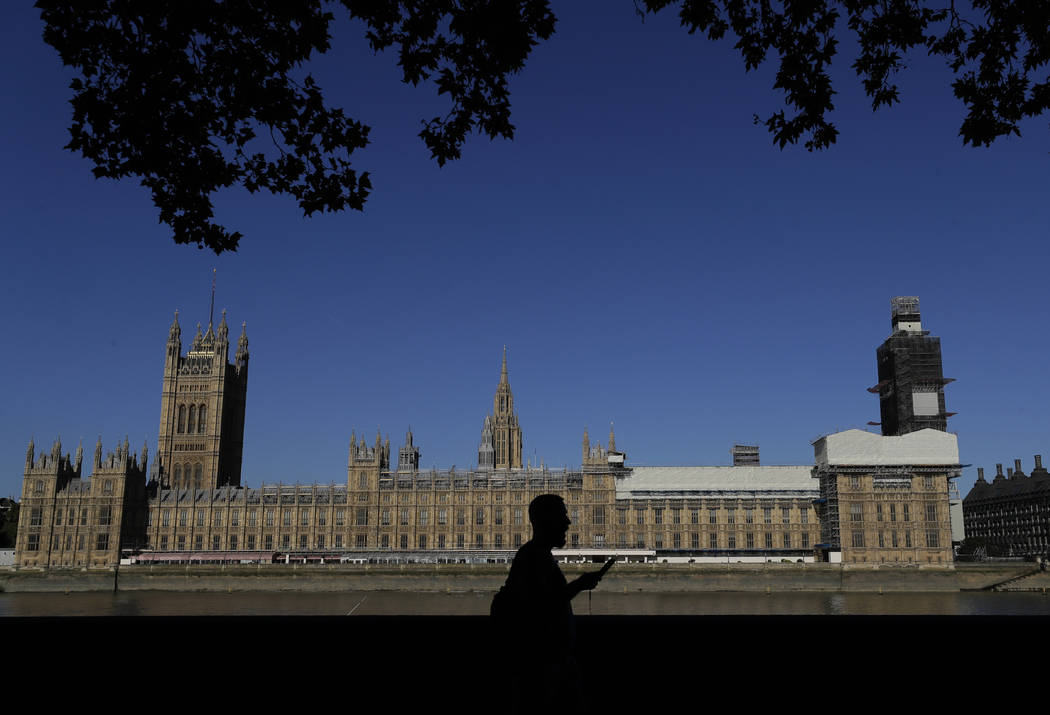Backlash grows to Johnson’s suspension of UK Parliament

LONDON — Opposition to British Prime Minister Boris Johnson’s move to suspend Parliament intensified Thursday, with the head of the Labour Party vowing “to politically stop him” from pushing through a chaotic no-deal Brexit.
Johnson’s tactic gave lawmakers little time to prevent Britain from crashing out of the European Union without an agreement on Oct. 31.
But a backlash to the maneuver has unified the disparate political opposition, bringing protests, legal action and a petition with more than 1 million signatures.
The confrontation is almost certain to increase next week when lawmakers return from their summer recess for a brief session. They are pledging to challenge what Labour Party leader Jeremy Corbyn has called Johnson’s “smash-and-grab raid against our democracy.”
“What we’re going to do is try to politically stop him on Tuesday with a parliamentary process in order to legislate to prevent a no-deal Brexit and also to try and prevent him shutting down Parliament in this utterly crucial period,” Corbyn told Sky News. “We believe we can do it.”
Outside the House of Commons, lawmakers giving interviews had to speak over chants of “Stop the coup! Stop the coup!” Smaller rallies took place in other towns and cities on Wednesday after Johnson announced his move.
A petition on a government website demanding that Parliament not be suspended has gotten more than 1 million signatures — guaranteeing that it will be considered for debate.
Lawmakers asked a Scottish court to rule that suspending Parliament is illegal. Businesswoman Gina Miller, who won a ruling in the Supreme Court in 2017 that stopped the government from triggering the countdown to Brexit without a vote in Parliament, has another legal challenge in the works. A human rights campaigner has sued in Northern Ireland, arguing that the historic Good Friday accord that brought peace is in jeopardy because of Johnson’s actions.
Bishops from the Church of England expressed their concern about the “economic shocks” of a no-deal Brexit on the poor and other vulnerable people.
House of Commons leader Jacob Rees-Mogg dismissed the fury and described Johnson’s move as constitutional and proper.
“I think the outrage is phony and it is created by people who don’t want us to leave the European Union and are trying very hard to overturn the referendum result and don’t want the benefits of leaving the European Union,” he told the BBC.
The action by Johnson, who became prime minister last month, prompted ruptures across the political spectrum, including among members of his Conservative Party. Scottish Conservative leader Ruth Davidson, who has differed with Johnson in the past, resigned her leadership post Thursday. Though the popular leader cited family reasons, the timing of such a decision following Johnson’s seismic move suggested that she disagreed with his tactics.
Others in the party are more obviously concerned. Senior Conservative lawmaker Ken Clarke was among those describing the suspension of Parliament as “absurd.”
“He has just given in to the fanatic element of his followers and decided to go hell for leather,” Clarke said. “I hope it will bring together the sensible majority of Parliament who will find some alternative.”
The outpouring of anger followed three years of tensions after the 2016 referendum on EU membership, in which 52% of voters favored withdrawing.
The EU is adamant it will not renegotiate the agreement struck with former Prime Minister Theresa May on the terms of Britain’s departure and the framework of future relations. Without such a deal, Britain faces a chaotic Brexit that economists warn would disrupt trade by imposing tariffs and customs checks between Britain and the bloc, lower the value of the pound and plunge the U.K. into recession. May resigned in defeat after failing three times to secure Parliament’s backing for her divorce deal with the bloc.
Johnson has told European officials that it won’t be possible to agree a deal on Britain’s departure from the bloc without the removal of controversial language on a “backstop” aimed at avoiding the return of a border between EU member Ireland and Britain’s Northern Ireland. He said at the close of the G-7 summit in Biarritz, France, on Monday, that he was “marginally more optimistic,” of progress.
The EU’s chief Brexit negotiator, Michel Barnier, warned Johnson that he won’t back down.
“In all circumstances, the EU will continue to protect the interests of its citizens and companies, as well as the conditions for peace and stability on the island of Ireland,” Barnier said.
Associated Press writers Lorne Cook in Helsinki, Finland, and Raf Casert in Brussels contributed.